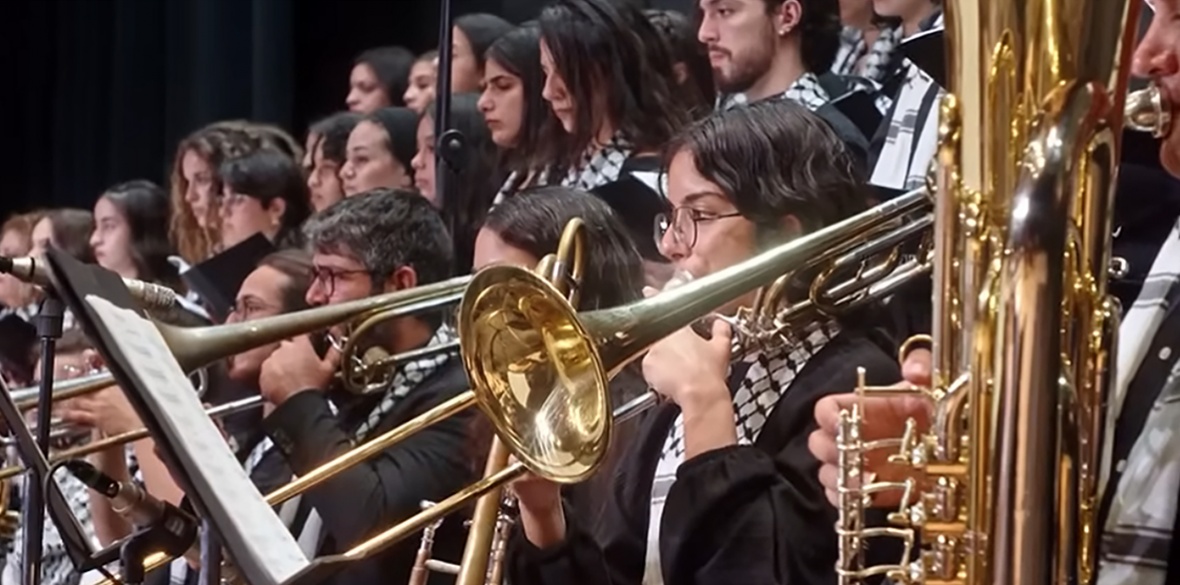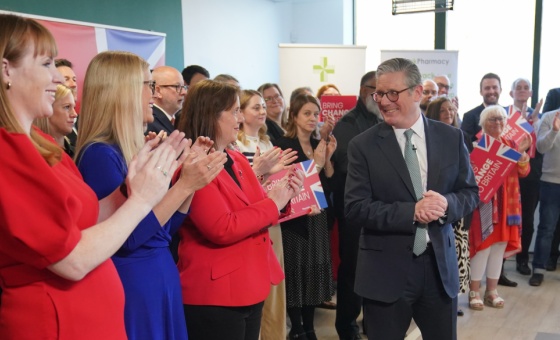This is the last article you can read this month
You can read more article this month
You can read more articles this month
Sorry your limit is up for this month
Reset on:
Please help support the Morning Star by subscribing here
Mary of Gaza
by Suhail Khoury
★★★★★
“PEACE on Earth is not for us. Not for my son, not for yours. Mary said to Mary,” these are the heartbreaking words which begin the cantata Mary of Gaza by Suhail Khoury, which was shared by the Edward Said National Conservatory of Music on its public channels on Christmas Eve, 2024.
Performed by Ibrahim Nasrallah (Narrator), the Palestine Youth Orchestra, the Amaan Choir, the Edward Said National Conservatory of Music Choir and Lamaar Elias conducting the 20-minute work of poetry sung by the chorus or narrated captures the sadness, grief and frustration at the situation the Palestinian people find themselves in during this particularly brutal conflict.
The music is equally fraught with this intensity, the evocations of Palestinian traditional music alongside the musical austerity that remind one of the darker cantatas by JS Bach, and the constant recapitulations of “Peace on Earth is not for us” strikes emotionally deeper and deeper into the heart.
The is cantata is heavily preoccupied by death and war, the music does not depict the horrendous destruction, however much like Faure’s Requiem. Its surreal calm and modesty is what makes it more devastating.
Why go deeper and deeper into the detail of the various atrocities of this conflict, when you can simply reiterate: “Peace on Earth is not for us.”
But the work is not nihilistic — on the contrary, this is where the revolutionary quality of this piece rings aloud.
Across the 20th century and into this one, the valid question remains: what kind of music transmits best political ideas, either to evoke political emotion or to inspire people to revolution?
A wealth of music of great variety has been produced, however, it has far too often relied on aesthetic qualities alone. The reliance on the “true” or “correct” kind of music blinds composers to where a political quality can be found.
Christopher Caudwell in his Studies in a Dying Culture perfectly encapsulated this, when describing the work of William Shakespeare. The quality and skill of an artist, regardless of medium, is always important but the final ingredient, which can make an artist truly revolutionary, is the ability to capture the essence of the rising class.
In Shakespeare, it was the growing revolutionary energy which would eventually lead to the overthrow of the monarchy after the civil war.
In the case of Beethoven, it was the ability to capture the spirit of the coming revolts in the 19th century, and in Mary of Gaza, Suhail Khoury captures succinctly the basic but profound desire for a genuine and lasting peace in Palestine.
The lines of the finale make it impressively clear: “O God, peace on this earth will be mine. Mine, then yours … I will sing in the name of twenty thousand, forty thousand, risen on this land of ours. Peace on this earth was ours before them and peace on this earth will be ours after them.”
Many comparisons come to mind when, during many moments of great strife, other composers found ways to capture such feelings and fashion them into a radical voice of defiance.
Mikis Theodorakis’s setting of Pablo Neruda’s Canto General, Hanns Eisler’s Deutsche Sinfonie, Elizabeth Maconchy’s cheeky little song The Shark and the Whale all captured these feelings. However, it is Shostakovich’s Leningrad Symphony which was written during the Nazi siege of Leningrad.
These works written at a time when blood was spilt and the days were filled with darkness and destruction. To give riposte to such times with music that is defiant, one which shows that despite the terror that is happening — and more of which may still come — it is to show the people will remain resilient and can, in the end, win.
This enduring spirit has been a remarkable quality of the Palestinian people for generations, and every Palestinian I have met is imbued with this profound positive energy.
Mary of Gaza will stick with me for a long time. And I strongly urge everyone to listen to it. And despite the darkness of days facing Palestinians, aided by the hypocrisy of Western political leaders, it is reassuring to know that while Palestinians can still make music like this they will, eventually, find that peace on this earth is theirs too.










